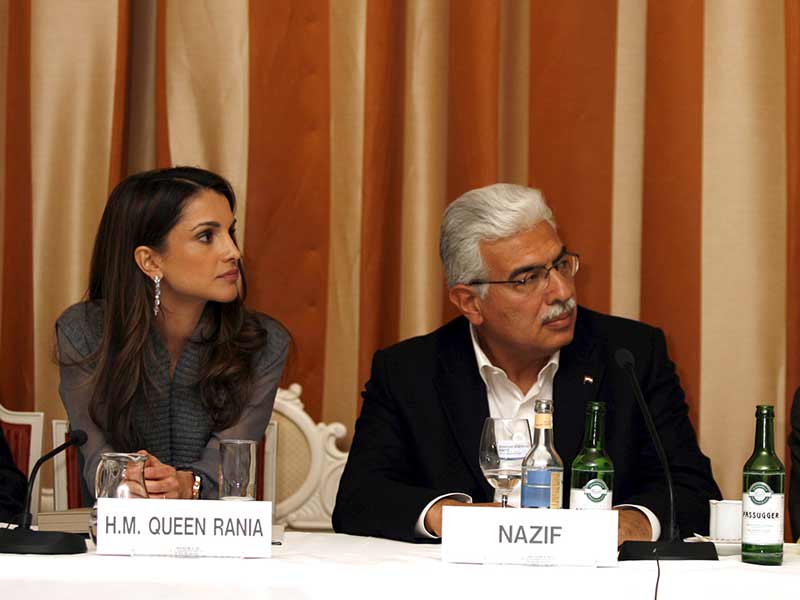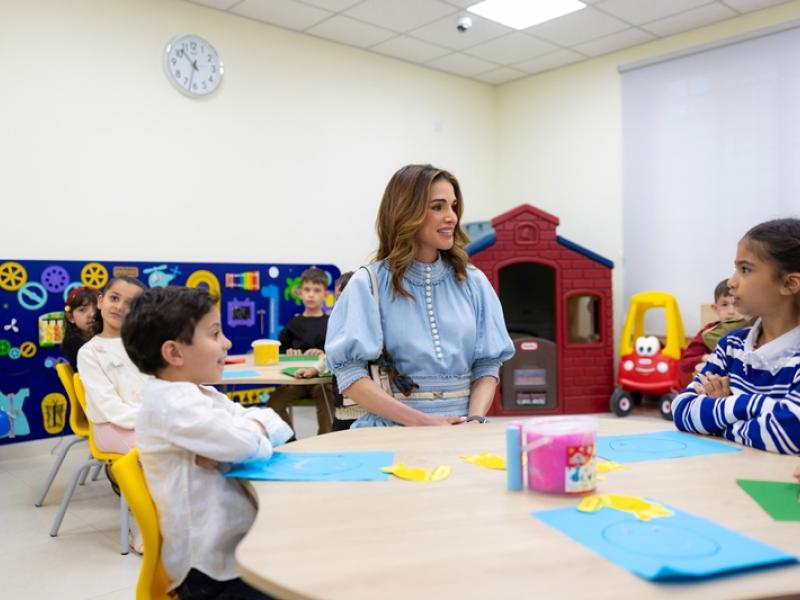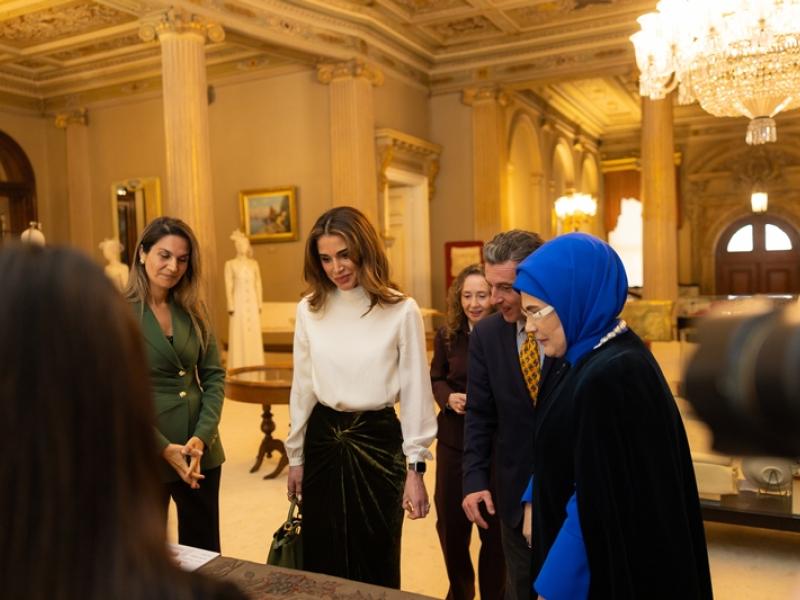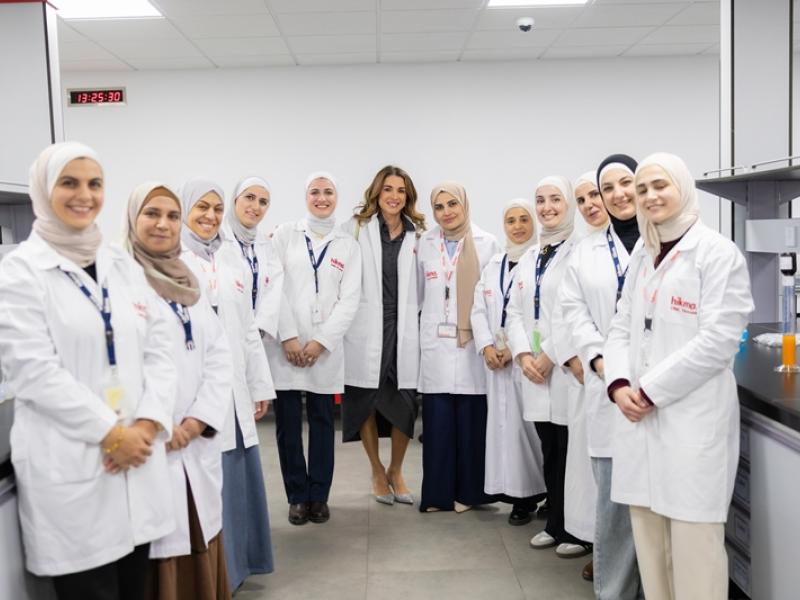(Office of Her Majesty – Press Department – Davos) - Four years after launching the Jordan Education Initiative (JEI) at the World Economic Forum (WEF) in Davos, Switzerland, and two years after taking the initiative global, government and business leaders gathered in Davos, to highlight the initiative's achievements and outline the value of increasing public private collaboration to expand its outreach.
The names and faces in the room were all familiar during the Multi-Stakeholders Partnerships in Education session. They have attended this session before to show their solid commitment in supporting access to universal quality education.
Her Majesty Queen Rania Al Abdullah; Bill Gates, Chairman of Microsoft; John Chambers, Chairman and Chief Executive Officer of Cisco Systems; Alex Wong, Director of the World Economic Forum and Head of the Centre for Global Industries in Geneva; Lord Carey of Clifton, Former Archbishop of Canterbury; Craig Barrett, Chairman of the Board of Intel Corporation; Peter Smith, Assistant Director-General of UNESCO’s Education Sector; and Ahmed Nazif, Prime Minister of Egypt joined forces to commit to improving the existing framework of the Global Education Initiative and extending its outreach.
"Jordan showed a special kind of daring four years ago, when we embraced an experiment called the Jordan Education Initiative," said Queen Rania, "Not because we were not fully committed to educational reform – but because, to be frank, at that time in Jordan, the idea of public-private sector partnership felt unfamiliar."
JEI was launched as an innovative public-private partnership designed to develop new approaches to teaching and learning and creating a nurturing and enabling environment of self-discovery and experiential learning.
Her Majesty noted that, "Jordanians are not the types to be put off by the unknown. We took the leap, hand-in-hand with a group of extraordinary partners".
Having the public-private collaboration from the beginning is what led to the success of JEI. Queen Rania cited some of those successes including the achievements in Jordan’s 100 Discovery Schools "where administrators are promoting student-centered learning experiences; science teachers are using technology to bring virtual experiments to the classroom; math teachers are being exposed to new technologies themselves as they help develop e-curricula; and educators who devise new Arabic materials are sharing the wealth of their knowledge with one another through an online Innovative Teachers' Network".
Another testament to the success of JEI was when Palestine, Rajasthan and Egypt adopted the model. Prime Minister Nazif noted that since its adoption in Egypt, the initiative has trained over 60,000 teachers and installed computer labs in approximately 19,000 schools. With over 15 million students, 44,000 schools and over 1 million teachers to reach Nazif said they are exploring the idea of public private partnership further.
The presence of the public sector at this meeting demonstrated their commitment. Even more crucial, though, has been their presence during the development of the initiative. Applauding the collaboration between the private and public sector, Queen Rania said, "Employees from firms like Microsoft, Intel and CISCO are doing hands-on teacher training, and private sector representatives are volunteering with INJAZ, Jordan’s youth development program, to mentor young people and teach them practical skills like public speaking or writing a resume."
Chambers noted that this is not the first generation to commit to improving access to education for all, but this effort of collaboration will fast track the progress and ensure that quality education will be available to the global community.
During her participation in the Wisdom of Youth panel, Friday, Her Majesty heard the voice of a younger generation calling for quality access to education, and it is no coincidence that the leaders gathered at this session have committed themselves to working on just that. Lord Carney noted the cyclical relationship of education, or lack thereof. "Illiteracy leads to ignorance, which leads to poverty," he said. By tackling illiteracy through initiatives such as GEI, they hope to increase the living standards for global citizens by seeing the knock on effects in improving health and financial status as well.
There will be big changes in education over the next twenty years, said Gates, and we need to develop models to empower students. The Bill and Melinda Gates Foundation has focused on empowering students by committing resources, donating libraries, and highlighting the need for quality education. It is the level of one's education that determines how you succeed in life, he said.
As Jordan's Discovery Schools continue to document their achievements, and collaboration continues to grow, Her Majesty said, "We are eager to help the WEF, UNESCO, and our partners, make this project truly global… We also hope that as visionary business leaders continue to conceive of the inconceivable, they will look to Jordan as an able accomplice in making the impossible come true".



